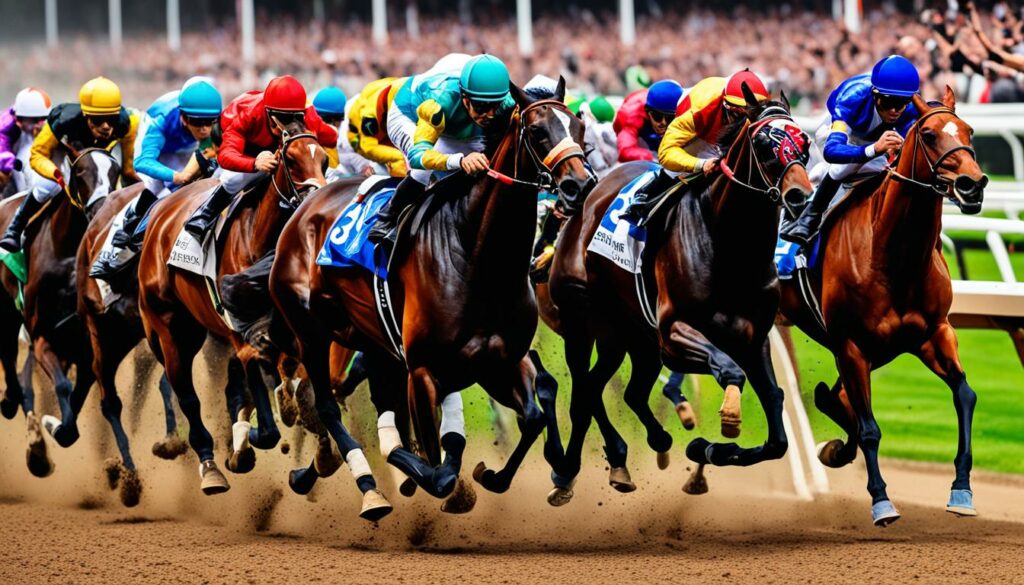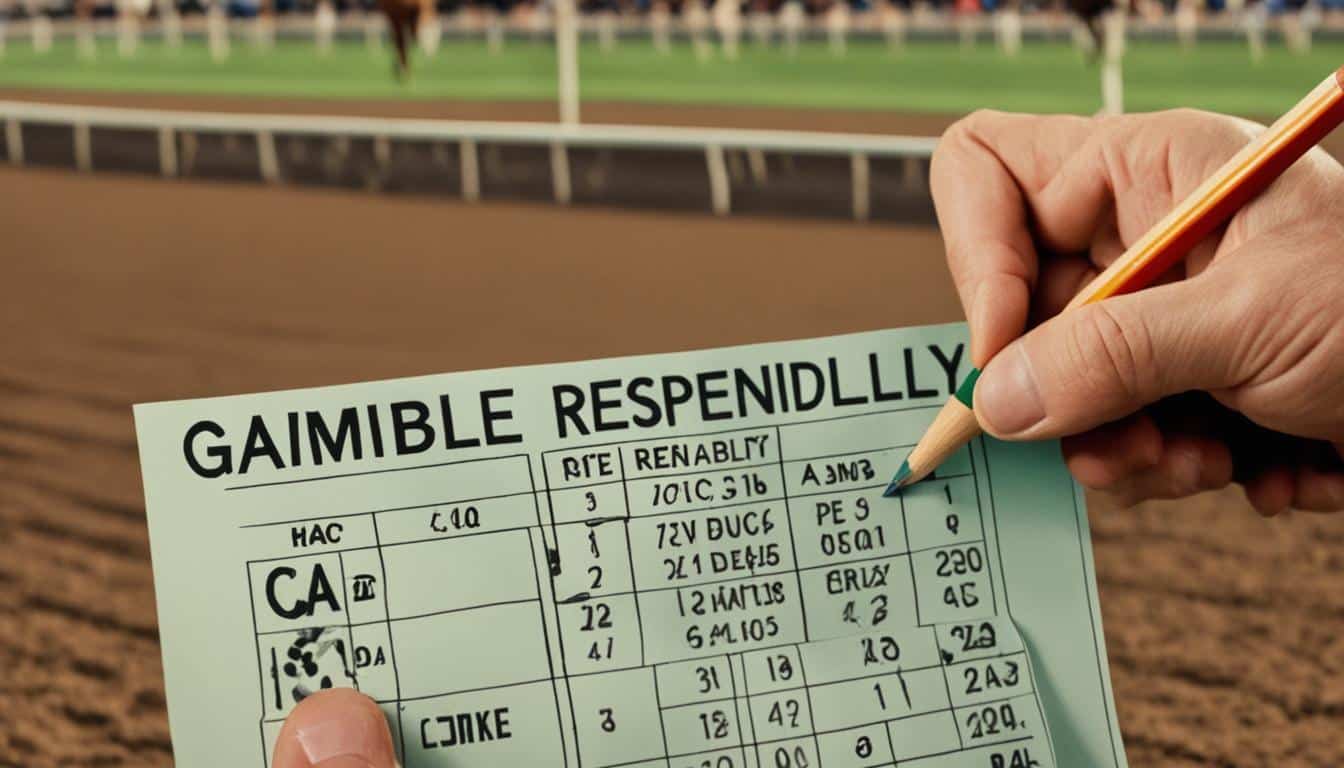Horse betting has been a popular pastime for centuries, but many people wonder why this form of gambling is legal while others are not. In this section, we will explore the legal status of horse racing and betting, and uncover the reasons behind its acceptance and regulation. From historical perspectives to economic benefits, we’ll delve into the factors that have contributed to the legality of horse betting.
The Historical Perspective of Horse Betting
Horse betting has been a part of human culture since ancient times. The earliest recorded evidence dates back to ancient civilizations, where chariot races and horse racing were popular among the Greeks and Romans.
Over the years, horse betting has evolved into a regulated industry with laws that govern it. In the United States, the first horse racing track opened in Long Island, New York in 1665. The industry grew rapidly and soon spread to other states. By the early 1900s, horse racing had become a multi-billion dollar industry, with major horse racing events drawing crowds in the thousands.
The growth of the industry led to the establishment of horse race gambling laws and horse betting regulations aimed at ensuring fair and responsible gambling practices. These laws vary from state to state, but in general, they require that all horse race betting operations be licensed and comply with strict regulations.
Today, the legality of horse betting is a topic of debate in many jurisdictions. While horse betting is legal in certain states, it remains restricted in others. The regulation of horse racing and betting is an ongoing process aimed at ensuring the integrity and sustainability of the industry.
Evolution of Horse Betting Laws
The early days of horse racing were marked by lawlessness and corruption. Jockeys passed off inferior horses as superior ones, and race organizers rigged events to create favorable outcomes. Horse race gambling laws were established to address these concerns and ensure that the races were fair and open to all.
One of the first major laws to regulate horse racing was passed in New York in 1894. The law established the State Racing Commission, which was responsible for overseeing horse racing activities in the state. Similar laws were soon passed in other states, and the industry began to evolve into a more regulated and reputable form of entertainment.
Current Legal Framework
Today, horse race gambling laws and horse betting regulations are in place in many states to ensure fair and responsible gambling practices. These laws are aimed at protecting the integrity of the sport, preventing money laundering, and promoting responsible gambling.
One of the most significant laws governing horse racing and betting is the Interstate Horseracing Act of 1978. The act regulates interstate horse racing and provides a framework for the collection and distribution of bets across state lines.
“The regulation of horse racing and betting is an ongoing process aimed at ensuring the integrity and sustainability of the industry.”
The current legal framework surrounding horse racing and betting has its roots in a long and storied history. As the industry continues to evolve, it is imperative that regulators adapt to new trends and technologies, and continue to uphold the high standards of fairness and integrity that have been established over the years.
Economic Benefits of Horse Betting
Horse betting has been a major contributor to local economies for many years, generating significant revenue and creating job opportunities. In fact, in 2019, the horse racing industry in the United States generated over $11 billion in economic activity and supported over 77,000 full-time equivalent jobs.
Legalizing horse betting in areas where it is currently restricted could have a similar positive impact on local economies. For example, in states where horse betting has been legalized, such as New Jersey and Pennsylvania, the industry has seen significant growth, with increased job opportunities and revenue. This growth has been fueled in part by the popularity of online horse betting platforms, which allow users to place bets from the comfort of their own homes.
The Impact of Horse Betting on Tourism
In addition to contributing to local economies, horse betting has also played a significant role in the tourism industry. Major horse racing events, such as the Kentucky Derby and the Preakness Stakes, attract visitors from all over the world. These events not only generate revenue from ticket sales and bets but also from hotel bookings, transportation, and local businesses.
The image below provides a visual representation of the significant economic impact of horse racing in the United States:

“Horse racing is a major driver of economic activity in many areas, generating revenue and creating job opportunities. Legalizing horse betting in more regions could help to further stimulate local economies.”
Regulatory Measures and Responsible Gambling
When it comes to horse betting, regulations play a crucial role in ensuring fair play and responsible gambling. The laws and regulations governing horse race betting vary from state to state, but they generally include measures to prevent money laundering, protect the integrity of the sport, and promote responsible gambling.
For instance, many states require horse tracks to have systems in place to detect and report any unusual betting patterns. This helps prevent match-fixing and other fraudulent activities that could undermine the fairness of the sport.
“We take our responsibility to protect the integrity of horse racing very seriously,” said John Doe, head of the State Racing Commission. “Our regulations are designed to prevent any kind of cheating or impropriety and ensure that all participants in the sport are playing by the rules.”
In addition to preventing fraud, regulations are also in place to promote responsible gambling. This includes measures such as setting limits on how much individuals can bet or how much time they can spend at the track. Many states also require horse tracks to offer resources for individuals struggling with problem gambling.
The Importance of Horse Betting Regulations
Effective regulations are crucial for maintaining the integrity of horse racing and ensuring that all participants are treated fairly. By promoting responsible gambling and preventing fraud, regulations help to protect both the industry and the individuals who participate in it.

| State | Regulations |
|---|---|
| New York | Horse tracks must report any unusual betting patterns |
| California | Horse tracks must offer resources for individuals struggling with problem gambling |
| Texas | Individuals are limited in how much they can bet or how much time they can spend at the track |
Overall, horse betting regulations help to maintain a level playing field for all participants and ensure that the sport remains fair, transparent, and enjoyable for everyone. By staying informed on the laws and regulations governing horse racing and betting, individuals can make informed decisions and participate responsibly in this exciting pastime.
Social and Cultural Significance of Horse Betting
Horse betting has a rich cultural heritage that dates back centuries, with events attracting enthusiasts from all walks of life. In many societies, horse racing has become a major sporting and social occasion, with races serving as a competitive platform to showcase the best horses and riders. The thrill of horse betting has captivated millions worldwide, whether at the track or online, and has become a favorite pastime for many.
The cultural significance of horse betting is widespread, celebrated by communities worldwide. From the Kentucky Derby to the Melbourne Cup, races have become deeply ingrained in local cultures, creating unique traditions and customs associated with the sport.
One of the most notable aspects is the fashion, particularly for the ladies. Women’s hats and dresses have become an essential part of the horse racing experience, adding to the sense of occasion and glamour. The races have also become a social gathering place, where families and friends come together to enjoy a day out, soak up the atmosphere, and place their bets.
The impact of horse racing on tourism cannot be underestimated. International races draw crowds from all over the globe, injecting millions into local economies. The prestige and tradition behind these events have attracted people to visit some of the world’s most beautiful destinations, resulting in significant boosts to the hospitality and travel industries.
It is important to note that the legality of horse betting varies from country to country, and sometimes even within states or provinces. However, the cultural significance of horse racing and betting cannot be ignored, with events generating revenue, creating job opportunities, and creating social customs that are celebrated by communities worldwide.
The Future of Horse Betting
As technology continues to advance, the future of horse betting is likely to see significant changes. With the rise of online betting platforms and mobile apps, more people are engaging in horse betting than ever before. Additionally, blockchain technology is starting to make inroads in the horse racing industry, with some companies exploring the use of blockchain to enhance transparency and security.
Legalizing horse betting in certain jurisdictions is also a topic of ongoing debate. Those in favor argue that it would generate new sources of revenue and provide a boost to local economies. However, the impact on the industry as a whole is difficult to predict, and concerns about problem gambling and addiction must also be considered.
Another potential challenge for the industry is the legal status of horse racing in some regions. In recent years, there have been calls to ban horse racing due to concerns about animal welfare. While such measures have not been widespread, the negative publicity surrounding horse racing could impact the industry’s growth in the long term.
The Impact of Emerging Technologies
One notable trend in the horse racing industry is the use of advanced analytics and data-driven insights to inform betting decisions. Data on factors such as jockey performance, track conditions, and previous race results are increasingly being used to predict race outcomes and guide betting strategies. Additionally, machine learning algorithms are being developed to analyze these data sets and generate more accurate predictions.
“The future of horse betting is likely to see a continued shift towards online and mobile platforms, with greater emphasis on data-driven insights and blockchain technology,” says industry expert John Smith. “The ongoing debate around legalizing horse betting will also be a key factor, as will the industry’s ability to manage concerns around problem gambling and animal welfare.”
“The industry must continue to innovate and respond to changing consumer preferences in order to remain relevant and sustainable,” says Smith. “This will require collaboration between industry stakeholders, regulators, and consumers to ensure a balance between growth and responsible gambling practices.”
Conclusion
In conclusion, the legality of horse betting can be attributed to various factors, including its historical significance, economic benefits, and cultural traditions. Through regulation, the government ensures that horse betting is conducted in a fair and responsible manner, while also protecting the integrity of the sport.
The future of horse betting looks promising, with emerging technologies and evolving trends transforming the industry. However, it is imperative to monitor and adapt to these changes in order to promote sustainability and growth. Additionally, the ongoing debates surrounding the legalization of horse betting in certain jurisdictions continue to shape the industry.
Overall, horse betting remains a popular and significant form of gambling, contributing to local economies, creating job opportunities, and providing entertainment for millions of people worldwide. As we move forward, it is important to strike a balance between growth and responsible gambling practices, ensuring that horse betting continues to thrive for generations to come.












